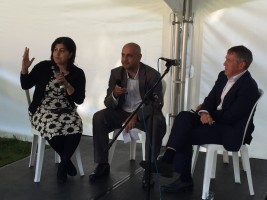
Other than the blazing sunshine, it was a quintessentially English setting. Straight off the set of the Bake-Off, in fact: a tea party, hosted in a marquee, with cakes, surrounded by trees. The band and choir of the local Woking High School entertained the guests, which included representatives of the local council and Woking Mosque, the oldest purpose-built mosque in the country, and serving Muslim soldiers, paying their respects to the Muslim servicemen who died fighting for Britain in the First World War, whom the Woking Peace Garden commemorates.
The garden itself – typically Islamic in its design, typically English in its Surrey location and choice of planting, was an ideal setting for British Future’s A Very English Islam event, where the nature and future of an English Islam was the chief topic of discussion.
“I’ve always described Islam as like a river, which takes its colour from the bed over which it flows – and my Islam flows over Yorkshire and over England,” said Baroness Warsi, in conversation with former Labour cabinet minister John Denham and BBC Head of Religion and Ethics Aaqil Ahmed. “Therefore it’s quite right that over time, as Islam takes the colour of the space in which it finds itself, it will start to reflect a very clear Englishness,” ” she added.
For that to happen, of course, the majority needs to have a clear sense of its own identity. “The river bed must know what it represents,’ said Baroness Warsi. “If the bed is a slightly murky grey and doesn’t really know what it stands for, then my Islam is going to be just as confused and murky grey. For minority faiths to feel truly comfortable about who they are, the majority has got to be sure about who it is…. A Europe that is sure about its Christian heritage is a much easier place to be a Muslim.”
John Denham, Director of the Centre for English Identity and Politics at the University of Winchester, agreed that defining national identity wasn’t a straightforward task:
“National identity is a very strange thing… try to pin it down and it’s a bit slippery. At the same time, national identities are capable of driving hugely powerful and strong emotions – so it is a real thing. Identities are in our heads but they’re a collection of stories that tell us who we are, what we share, how we all came to be here, what we have in common and what we want to do.”
Getting this right is important for integration, he suggested, and will require commitment from both minority and majority Britons:
“The challenge here is this: is there an Englishness that is wholly accepting of Islam and is there an Islam that is wholly comfortable to be English?”
Dr Timothy Winter, Shaykh Zayed Lecturer of Islamic Studies at Cambridge University, stated that there is no reason in classical Islamic thought to prevent such an accommodation between Islam and Englishness – quite the opposite, in fact:
“A local British Islam, or a range of British Islams, is religiously authentic and even mandatory,” he told the audience, adding that “The classical sharia manuals tell us that local custom and precedent may be incorporated into Muslim life, unless they evidently flaunt a scriptural truth. Only fundamentalism of the Wahhabi type discounts this Muslim normativity.”
An English Islam, one that feels open to people of all races and faiths in England, should be within our grasp. But it will not find itself. John Denham set this challenge to the audience, as we sipped our tea in the Surrey countryside:
“We have a choice, really, of trying to make a national identity that works, that includes everybody; or we could end up with a rather divided national identity which thrusts some people out.”





